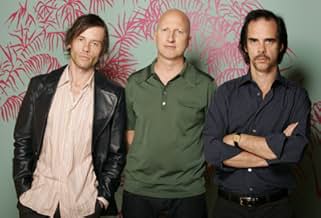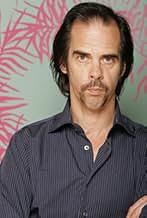Um homem da lei captura um famoso fora a lei e dá-lhe nove dias para matar seu irmão mais velho, ou então eles executarão seu irmão mais novo.Um homem da lei captura um famoso fora a lei e dá-lhe nove dias para matar seu irmão mais velho, ou então eles executarão seu irmão mais novo.Um homem da lei captura um famoso fora a lei e dá-lhe nove dias para matar seu irmão mais velho, ou então eles executarão seu irmão mais novo.
- Direção
- Roteirista
- Artistas
- Prêmios
- 14 vitórias e 30 indicações no total
Avaliações em destaque
Directed by Brisbanite John Hillcoate from a script by Aussie indie icon Nick Cave, this film has some of the most gorgeous photography of the Australian outback ever committed to film, showcasing it's unique desolate beauty in it's dust, flies and exquisite sunsets.
Hillcoate assembles a very fine ensemble cast, most notably Ray Winstone as Captain Stanley and Guy Pearce as Charlie Burns - two actors performing at the top of their game. Danny Huston is effective as Arthur Burns, a man whose serene exterior belies his vicious temperament. Other performers include Emily Watson and John Hurt, as well as fine Australian talent David Wenham, Leah Purcell, Tommy Lewis and quintessential movie aborigine David Gulpilil. All performances are excellent.
Despite it's high violence quotient, the film has an admirable lack of moralistic tone. There are no obvious good guys and bad guys, all the characters are shades of grey possessing both positive and negative attributes, although some characters may lean one way or the other. In particular, Captain Stanley has a good heart though history may judge his methods of justice with contempt, and Charlie Burns has a fierce sense of loyalty and honour but his associated family ties have led him to commit horrific crimes. Even Captain Stanley's wife, Martha, in all her Victorian innocence and naivety, has a dark side to her soul; an attribute which will further propel all towards their destinies.
It's strong subtext of white colonialists' condescending treatment of the aboriginal population puts this film in fine company with other Australian indigenous-themed films such as Fred Schepisi's The Chant Of Jimmy Blacksmith, Nicholas Roeg's Walkabout, Rolf de Heer's The Tracker and Phillip Noyce's Rabbit Proof Fence. The Proposition is the best of these. This is a big call, I know, but the fact is that none of those other very fine Australian films possess the tension which so completely permeates Hillcoates' picture. This film represents a major achievement for both Hillcoate and Cave and is the best Australian film to leave these shores since Ray Lawrence's Lantana.
8.5 out of 10.
Slick. :cool:
The plot summary and the advertising seemed to offer some form of thriller but in reality the film delivers something altogether more interesting and memorable. Set in the Australia outback where settlements are being born and laws being established, the film charts the moral complexities of the good and bad in the story while painting a beautifully bleak backdrop of open space and bloody, pointless violence. It is not an easy film to watch and certainly not one to expect to come out of laughing or feeling good about things. Nor is it a film to go into expecting a traditional plot because it is this area where the film is at its weakest because it is not a "this happened, this happened then that happened" sort of story. This is not to say it is boring but it does require patience for the casual viewer. Personally I found most scenes to be interesting but most admit that the narrative kind of hangs around rather than moving forward firmly in one direction.
The substance is more in the characters than in the narrative and on this level it was engaging. Although the posters and summary will tell you this is about the Burns brothers, it is as much if not more about Stanley and his wife. It is he would has the duality of trying to defeat violence by encouraging it while also heaving under the burden of trying to take this job entirely on his own shoulders while protecting his wife from knowing anything about the real world out in the desert. It is an interesting thread and for my money it was the thrust of the story the issue of what Charlie will do is actually part of Stanley's story rather than the other way around. With this as the story the film is much better because it does paint a convincing tale around this. The Burns brothers thread is still interesting but less is done with it with Arthur himself being very little more than an enigmatic plot device.
Style wise the film is fantastic as it delivers a bleakly convincing picture of the birth of Australia. The landscape is beautifully filmed and, although Cave could have done more as writer, his contribution to the soundtrack is as welcome as it is well used. The sudden moments of violence are uncomfortable and difficult to watch. They are delivered in visceral moments of gore that are bereft of any touches that would glamorise the death; here it is horrible and full of flies. Of course you are right to note that a hauntingly stylish delivery should not be taken as a replacement for substance but I think it has just about enough of the latter and an abundance of the former to carry the film as a whole.
The cast are mixed but nobody really turns in a bad performance. Winstone dominates the film with easily the best performance and the most interesting character. His Captain Stanley wears every decision and Winstone allows us to see the effect this country has had on his soul. Watson is also good, simple at first but touched by the violence that her husband cannot defend her from. Pearce is an astute and subtle actor who keeps the audience with his thread even though it is less interesting; however Huston is not used as well as he deserved. He gives a memorable performance but his character is never more than an action waiting to happen. Wilson is convincingly young and his flogging is difficult to stomach, while Hurt turns up in a nice cameo as a bounty hunter. As much as the performances though, the film is about atmosphere, and Hillcoat has done a great job in producing a desolate film that is as beautiful as it is disheartening.
An imperfect film due to the lack of a strong narrative, this is still a memorable affair for many reasons. It looks great, has a great use of music and produces a haunting desolation in the country and the characters. Not a fun night out by any means but for what it is, it is well worth seeing.
There's a fantastic blend of European and Australian sensibilities here that makes this the least clichéd film to come out of this country for 20-odd years - and if it doesn't do well, it'll be because an increasingly soft and gutless nation is afraid to venture out of their frappuccino and mortgage comfort zone.
This is powerful, worthy art.
Nick Cave's script is shot through with his signature dark poetry; it translates wonderfully onto the screen. Guy Pearce, Ray Winston and Danny Huston put in powerful performances. Emily Watson is also superb but somehow this film seems to be more about men than women and so her performance feels a little isolated from the rest of the movie.
The film is a strangely skewed morality tale crossed with a tale of the absurd. There is something so absurd about Captain Stanley's English breakfast and standard roses in the hot, fly-blown wastelands of the movie, and off course there is something so absurd about how violent humans beings are to each other. Despite all the violence though, some of which is stomach-turning, this movie has some moments of great tenderness and elegy.
Você sabia?
- CuriosidadesIn a 2018 interview, Guy Pearce said that this is his favorite of all of the movies he's ever done.
- Erros de gravaçãoAlthough the story takes place in the 1880s, Jellon sings "Danny Boy" - which wasn't published until 1913.
- Citações
Jellon Lamb: Forgive me, sir, but I've been stuck here with no one but this sorry sack of Hibernian pig shit for conversation. Poor, poor Dan O'Reilly. Sit, sir. Drink with me.
[Charlie cocks his gun and points it to Lamb]
Charlie Burns: One more crack about the Irish, Mr. Lamb, and I'll shoot you. Am I clear?
Jellon Lamb: Oh, as the waters of Ennis, sir. Let us drink, then, to the Irish. No finer race of men have ever... peeled a potato.
[Charlie cocks his gun again and points it to Lamb]
Charlie Burns: Do you pray, Mr. Lamb?
- Cenas durante ou pós-créditosThe opening credits are shown first against a background of period photographs of Australia, which after a time become photographs of the actors/characters, locations and scenes in the film. The end credits are similarly displayed, but only period photographs are used. This is of special note in view of the noted disclaimer, since some indigenous aboriginal groups can be offended by such images.
- Trilhas sonorasThere Is a Happy Land
(1850)
Traditional
Music by Leonard P. Breedlove (uncredited) (1850)
Words by Andrew Young (1838)
Arranged by Nick Cave and Warren Ellis
Principais escolhas
- How long is The Proposition?Fornecido pela Alexa
Detalhes
Bilheteria
- Orçamento
- US$ 20.000.000 (estimativa)
- Faturamento bruto nos EUA e Canadá
- US$ 1.903.434
- Fim de semana de estreia nos EUA e Canadá
- US$ 32.681
- 7 de mai. de 2006
- Faturamento bruto mundial
- US$ 5.048.893
- Tempo de duração1 hora 44 minutos
- Cor
- Mixagem de som
- Proporção
- 2.39 : 1
Contribua para esta página








































